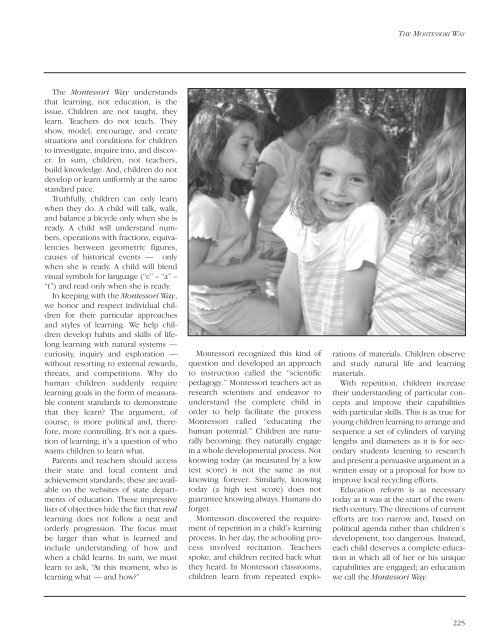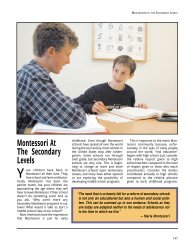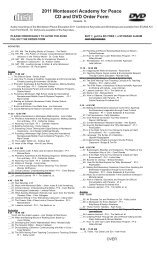Tim Seldin & Paul Epstein Ph.D. An Education for Life
Tim Seldin & Paul Epstein Ph.D. An Education for Life
Tim Seldin & Paul Epstein Ph.D. An Education for Life
You also want an ePaper? Increase the reach of your titles
YUMPU automatically turns print PDFs into web optimized ePapers that Google loves.
The Montessori Way understands<br />
that learning, not education, is the<br />
issue. Children are not taught, they<br />
learn. Teachers do not teach. They<br />
show, model, encourage, and create<br />
situations and conditions <strong>for</strong> children<br />
to investigate, inquire into, and discover.<br />
In sum, children, not teachers,<br />
build knowledge. <strong>An</strong>d, children do not<br />
develop or learn uni<strong>for</strong>mly at the same<br />
standard pace.<br />
Truthfully, children can only learn<br />
when they do. A child will talk, walk,<br />
and balance a bicycle only when she is<br />
ready. A child will understand numbers,<br />
operations with fractions, equivalencies<br />
between geometric figures,<br />
causes of historical events — only<br />
when she is ready. A child will blend<br />
visual symbols <strong>for</strong> language (“c” – “a” –<br />
“t”) and read only when she is ready.<br />
In keeping with the Montessori Way,<br />
we honor and respect individual children<br />
<strong>for</strong> their particular approaches<br />
and styles of learning. We help children<br />
develop habits and skills of lifelong<br />
learning with natural systems —<br />
curiosity, inquiry and exploration —<br />
without resorting to external rewards,<br />
threats, and competitions. Why do<br />
human children suddenly require<br />
learning goals in the <strong>for</strong>m of measurable<br />
content standards to demonstrate<br />
that they learn? The argument, of<br />
course, is more political and, there<strong>for</strong>e,<br />
more controlling. It’s not a question<br />
of learning; it’s a question of who<br />
wants children to learn what.<br />
Parents and teachers should access<br />
their state and local content and<br />
achievement standards; these are available<br />
on the websites of state departments<br />
of education. These impressive<br />
lists of objectives hide the fact that real<br />
learning does not follow a neat and<br />
orderly progression. The focus must<br />
be larger than what is learned and<br />
include understanding of how and<br />
when a child learns. In sum, we must<br />
learn to ask, “At this moment, who is<br />
learning what — and how?”<br />
Montessori recognized this kind of<br />
question and developed an approach<br />
to instruction called the “scientific<br />
pedagogy.” Montessori teachers act as<br />
research scientists and endeavor to<br />
understand the complete child in<br />
order to help facilitate the process<br />
Montessori called “educating the<br />
human potential.” Children are naturally<br />
becoming; they naturally engage<br />
in a whole developmental process. Not<br />
knowing today (as measured by a low<br />
test score) is not the same as not<br />
knowing <strong>for</strong>ever. Similarly, knowing<br />
today (a high test score) does not<br />
guarantee knowing always. Humans do<br />
<strong>for</strong>get.<br />
Montessori discovered the requirement<br />
of repetition in a child’s learning<br />
process. In her day, the schooling process<br />
involved recitation. Teachers<br />
spoke, and children recited back what<br />
they heard. In Montessori classrooms,<br />
children learn from repeated explo-<br />
THE MONTESSORI WAY<br />
rations of materials. Children observe<br />
and study natural life and learning<br />
materials.<br />
With repetition, children increase<br />
their understanding of particular concepts<br />
and improve their capabilities<br />
with particular skills. This is as true <strong>for</strong><br />
young children learning to arrange and<br />
sequence a set of cylinders of varying<br />
lengths and diameters as it is <strong>for</strong> secondary<br />
students learning to research<br />
and present a persuasive argument in a<br />
written essay or a proposal <strong>for</strong> how to<br />
improve local recycling ef<strong>for</strong>ts.<br />
<strong>Education</strong> re<strong>for</strong>m is as necessary<br />
today as it was at the start of the twentieth<br />
century. The directions of current<br />
ef<strong>for</strong>ts are too narrow and, based on<br />
political agenda rather than children’s<br />
development, too dangerous. Instead,<br />
each child deserves a complete education<br />
in which all of her or his unique<br />
capabilities are engaged; an education<br />
we call the Montessori Way.<br />
225




